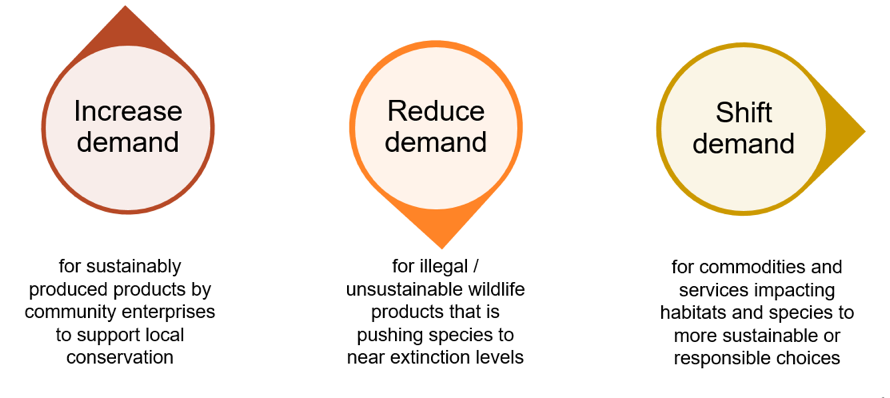The WWF is run at a local level by the following offices...
- WWF Global
- Adria
- Argentina
- Armenia
- AsiaPacific
- Australia
- Austria
- Azerbaijan
- Belgium
- Bhutan
- Bolivia
- Borneo
- Brazil
- Bulgaria
- Cambodia
- Cameroon
- Canada
- Caucasus
- Central African Republic
- Central America
- Chile
- China
- Colombia
- Croatia
- Democratic Republic of the Congo
- Denmark
- Ecuador
- European Policy Office
- Finland
Your favourite snack might contain cocoa, palm oil or soy that have contributed to deforestation, and its plastic packaging could pollute the ocean for 400 years.
Alternatively, it might have been produced according to the highest environmental and social standards, and by buying it, you’re helping protect wildlife and habitats, and improving livelihoods.
The choices we make about what to buy and how to live are just one part of the complex web of global supply and demand that touches every corner of the planet.
"We can’t keep living and consuming the same way and expect different results. Only by providing a good quality of life for all not tied to ever-increasing consumption, will we see positive results for people and nature. Companies, consumers and markets can all help shape sustainable supply and demand and ensure our future prosperity."
Cristianne Close
Markets Practice Leader
@WWFLeadMarkets
We’ve lost a fifth of the Amazon rainforest over the same period, half of all shallow water corals in the past 30 years, and populations of vertebrates have declined by 60% on average in the last 40 years.
Inefficient food production and wastefulness are destroying forests and grasslands, contributing to climate change, water scarcity, nature loss and pollution.
Even though we already produce enough food for ten billion people – the estimated world population in 2050 – we waste a third of it and continue to convert more forests into farmland we don’t need.

Can you imagine a world without coral reefs?
Coral reefs are at high risk of disappearing. We’ve already lost 50% and could lose 90% by 2050, spelling disaster for marine ecosystems, tourism and 120 million people that depend on reefs for food and livelihoods.
That’s why we’re helping communities around the world protect and manage coral reefs and restore fish stocks. Our coastal seas can recover, if we protect them in time.
Companies can develop new business models, influence supply chains, make production sustainable, and shape economies that benefit nature and people.
Local communities living in and managing important natural areas can improve their livelihoods, for example, by selling sustainable products or supporting ecotourism.
And governments can provide incentives and supportive regulations that shape sustainable production and consumption.
Innovation

Without a dramatic shift beyond ‘business as usual’, natural systems that support modern society will collapse.
That’s why WWF and Impact Hub are bringing entrepreneurs and environmentalists together to accelerate innovation for nature, ‘future-proof’ businesses and deliver transformational impact.
It also means reducing demand for products that harm wildlife directly – for example, through shutting down illegal ivory markets and tackling plastic pollution.
And it means shifting demand for products that have the biggest impacts on nature – commodities like palm oil, soy, beef and seafood – to more sustainable choices.

Together with business, we’re calling on governments to agree a New Deal for Nature and People that helps put nature on the path to recovery.
And to create a united business voice, we’ve helped set up Business for Nature – a global coalition calling for action to reverse nature loss and restore the planet’s vital natural systems.
If we look after nature together, nature will look after us.
To find out more about our work on markets please contact us on markets.practice@wwfint.org
Campaigns

Our Travel Ivory Free campaign encourages Chinese travellers to Thailand and Vietnam to buy alternative, sustainable souvenirs that are locally crafted.
The Your Plastic Diet campaign, showing you could be ingesting the equivalent of a credit card in plastic every week, is calling for a global treaty on plastic use and waste.
And ReSource: Plastic is helping companies design re-use and recycling into their business models.
World leaders and financial institutions participating in the Summit for a New Global Financing ...
Unlocking finance for developing countries is essential to deliver on global development, climate, ...
With a new landmark global agreement on nature directing governments to eliminate harmful ...
WWF is today launching a new tool, the Biodiversity Risk Filter (BRF) for companies and financial ...
In a new report, 'Seeing the forest for the trees - a practical guide for financial institutions to ...
Leading global nonprofits combine strengths in effort to promote economic and environmental ...
When it comes to mainstream ESG water data, investors currently lack contextual focus and common ...
The longest-running annual research of elephant ivory consumers in China -- the major market for ...
The Copalita-Zimatan-Huatulco watersheds (CZH) lie South of the state of Oaxaca, Mexico. The CZH is ...










